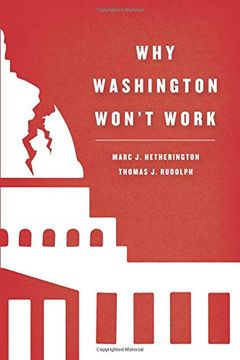Share
Why Washington Won't Work: Polarization, Political Trust, and the Governing Crisis (Chicago Studies in American Politics) (in English)
Marc J. Hetherington; Thomas J. Rudolph (Author)
·
University Of Chicago Press
· Paperback
Why Washington Won't Work: Polarization, Political Trust, and the Governing Crisis (Chicago Studies in American Politics) (in English) - Marc J. Hetherington; Thomas J. Rudolph
$ 34.29
$ 42.86
You save: $ 8.57
Choose the list to add your product or create one New List
✓ Product added successfully to the Wishlist.
Go to My WishlistsIt will be shipped from our warehouse between
Friday, June 28 and
Monday, July 01.
You will receive it anywhere in United States between 1 and 3 business days after shipment.
Synopsis "Why Washington Won't Work: Polarization, Political Trust, and the Governing Crisis (Chicago Studies in American Politics) (in English)"
Polarization is at an all-time high in the United States. But contrary to popular belief, Americans are polarized not so much in their policy preferences as in their feelings toward their political opponents: To an unprecedented degree, Republicans and Democrats simply do not like one another. No surprise that these deeply held negative feelings are central to the recent (also unprecedented) plunge in congressional productivity. The past three Congresses have gotten less done than any since scholars began measuring congressional productivity. In Why Washington Won’t Work, Marc J. Hetherington and Thomas J. Rudolph argue that a contemporary crisis of trust—people whose party is out of power have almost no trust in a government run by the other side—has deadlocked Congress. On most issues, party leaders can convince their own party to support their positions. In order to pass legislation, however, they must also create consensus by persuading some portion of the opposing party to trust in their vision for the future. Without trust, consensus fails to develop and compromise does not occur. Up until recently, such trust could still usually be found among the opposition, but not anymore. Political trust, the authors show, is far from a stable characteristic. It’s actually highly variable and contingent on a variety of factors, including whether one’s party is in control, which part of the government one is dealing with, and which policies or events are most salient at the moment. Political trust increases, for example, when the public is concerned with foreign policy—as in times of war—and it decreases in periods of weak economic performance. Hetherington and Rudolph do offer some suggestions about steps politicians and the public might take to increase political trust. Ultimately, however, they conclude that it is unlikely levels of political trust will significantly increase unless foreign concerns come to dominate and the economy is consistently strong.

